In celebration of Earth Day, The Sunday Night Environmental Group (SNEG) and Sunrise Middlebury hosted an Eco Fair last Friday in Wilson Hall, followed by a Town Hall Meeting on the Green New Deal in Mead Chapel.
Eco Fair
Representatives from an array of environmentally conscious on-campus and local organizations sat at rows of tables at the Eco Fair, describing their forms of activism to interested students and community members.
Several of the groups that attended specialize in encouraging more sustainable dietary practices. MiddVegan, a club that started in the fall, promoted their monthly vegan dinners at their table. Weybridge House, the local foods interest house, explained their emphasis on sustainable eating; they purchase all of their food, except oil and spices, from within 70 miles of the college. The Environmental Affairs Committee (EAC) displayed a possible version of the reusable, fully recyclable and compostable to-go cups they plan to introduce in the near future.
Other organizations highlighted the less-obvious connections between their work and environmental issues. Members of Feminist Action at Middlebury, representing Planned Parenthood, emphasized the disproportionate effect climate change has on female and minority communities. Juntos talked about the impacts of of environmental threats on migrant farmworkers.
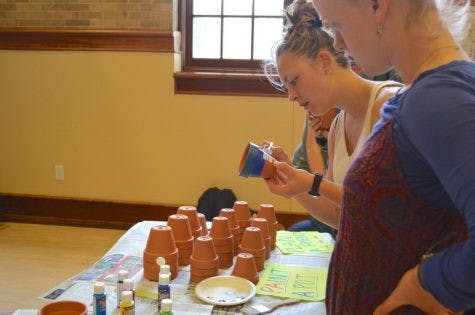
Some displays were more interactive. Students painted flower pots at a table labeled, “Plant a friend.” Luke Bazemore ’21 piled the Mountain Club table with sticks and challenged passerby to try starting a fire by rubbing the sticks together. Fortunately, nobody succeeded.
Haley Goodman ’21 ran a waste-sorting game at the Sustainability Solutions Lab table, asking students to determine which bins frequently-misplaced waste products really belonged in. “All of the disposable containers that you get from the Grille and Wilson Cafe, and our to-go cups, are all compostable, so that includes even things that look like plastic,” Goodman said. She said that plastic Amazon packages and bags are newly recyclable.
SNEG, Divest and Sunrise Middlebury, the college’s chapter of a national youth coalition combating climate change, shared a table with 350.org, the international climate organization founded at Middlebury in 2007. Across the aisle, the Vermont Public Interest Research Group (VPIRG) discussed their effort to ban single-use plastic bags in Vermont.
Margie Bickoff from Huddlebury, a new Addison County group that also advocates for a ban on single-use plastic bags and sews reusable cloth bags from repurposed fabrics to donate to food shelves and businesses, said the project grew from its founders’ shared desire to make change after the Women’s March.
“We call them re-bags for ‘reduce waste, reuse and recycle,’ and the fabric that’s being used is recycled,” she said. “In fact, some people have brought in their old curtains.”
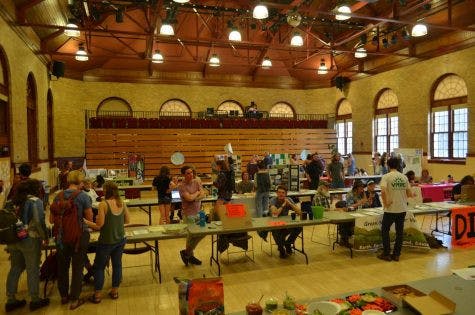
Town Hall
Sunrise Middlebury organized the Town Hall as part of a series of similar events hosted by affiliated groups nationwide to resolve misrepresentations and spark community conversations about the proposed Green New Deal.
Each of the six student presenters — Molly Babbin ’22, Phoebe Brown ’22.5, Katie Concannon ’21, Leif Taranta ’20.5, Emily Thompson ’22 and Olivia Sommers ’21 — began with their own reasons for joining the Sunrise Movement and organizing the Town Hall.
For Taranta, it was the devastating impact of fossil fuels on the air, water and people in their hometown of Philadelphia. For Babbin, it was witnessing the effects of rising sea levels at home in Connecticut. For Concannon, it was overwhelming climate grief following the 2018 Intergovernmental Panel on Climate Change (IPCC) report. For Brown, it was the impending loss of winter as it exists now.
They started the presentation with a brief history of the climate crisis and the influence of the wealthy on climate denial. A slide on ExxonMobil read, “They knew. They denied. They deflected responsibility.”
“I personally think money speaks louder than words,” Concannon said.
But unlike fossil fuel companies, young people have numbers, and “this system can’t stay up if we don’t let it,” Taranta said.
Over the next decade, the presenters said, the Green New Deal, aimed at combating climate change and economic inequality, will facilitate a just transition to a livable future through a national mobilization for all.
Using an interactive format that asked audience members to reflect on their own communities’ needs and to share those ideas with the people around them, the presenters introduced the three pillars of the Green New Deal — good jobs for all, a democratic economy and a good life for all — and described its plan to expand the lowest-carbon parts of the US economy to form an energy democracy and put wind and solar in the hands of the people.
“Green jobs,” they said, “have to be good jobs.”
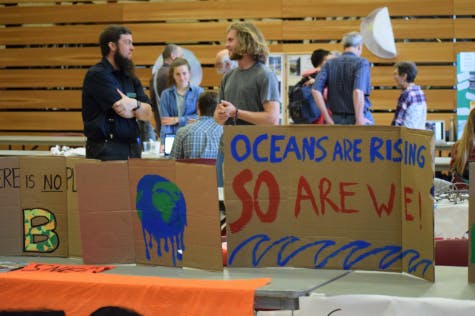
They ran through a few frequently asked questions: “How will it become concrete?” Through future legislation. “Is it technologically feasible?” Yes. “How will we pay for it?” In response, Babbin read a quote from Representative Alexandria Ocasio-Cortez, to resounding applause “Why is it that these questions arise only in connection with useful ideas, not wasteful ideas? Where were the ‘pay-fors’ for Bush’s $5 trillion wars and tax cuts, or for last year’s $2 trillion tax giveaway to billionaires? Why wasn’t financing those massive throwaways as scary as financing the rescue of our planet and middle class now seems to be to these naysayers?”
“In some places, I wouldn’t just get cheered when I read the quote,” Babbin later told The Campus, referencing the cynicism many outspoken opponents of the Green New Deal have already expressed. “In other states, maybe they’re skeptical, but here people were so on board.”
During the Town Hall, Taranta emphasized the importance of talking about the Green New Deal and combating the widespread misinformation that it is not economically, technologically socially or politically possible. “The idea that this will never happen is a propaganda campaign used against us to discourage us,” they said. It can happen — it has to.
Members of Sunrise Middlebury and SNEG are also drafting a Vermont Green New Deal, which they plan to present to the state legislature in January, nearly a year before the national proposal makes its way through Congress.
The six students concluded the presentation portion of the Town Hall by inviting local organizers, many of whom presented at the Eco Fair, to join them at the front and sing, “Social Justice Song 2019,” composed by Bickoff, the Huddlebury representative from the Eco Fair.
Gabe Desmond ’20.5 was the first audience member to speak. “Raise your hand if you’ve ever been affected by climate change,” he said. Every hand in the room went up. Desmond talked about a time last summer when he was unable to finish a hike in Seattle, Washington, because smoke from wildfires to the north, east and south had caused Seattle’s air quality to be the worst in the world.
“I think the really scary thing about climate change, to me, is that it’s hidden,” Desmond said. “When something like Irene happens, you don’t always think about climate change as being the thing that floods your home, right? It’s the water. When I can’t breathe, ‘Oh, it’s the fires. It’s not climate change.’ But it is climate change.”
One community member, who said he graduated from college more than 50 years ago, said politicians are cowardly, and their constituents need to push them to do greater things.
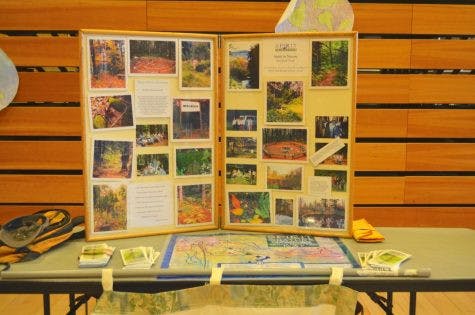
Another said that people do things for two reasons: out of fear of loss and out of desire for gain.
“We keep living in the fear of loss,” he said. “We need to change our minds. We need to change our hearts.”
A self-identified baby Feb asked about the best way to reach a Representative. An email? A phone call? A letter?
Fran Putnam, a local resident closely involved with SNEG, answered, “All of the above.”
“In 11 years,” said a girl at the front of the room, “I will be 24 years old. And I am completely terrified and overwhelmed by that, because I will only have lived a quarter of my life, hopefully, at that time. And if this doesn’t work out—though I’m hoping that it will—that’s it for me.” Describing the renewed hope she gained while participating in the Next Steps Climate Walk earlier this month, she started to cry. Her comment received one of the longest rounds of applause of the evening.
“I was anticipating more questions,” Concannon told The Campus. “I was ready to answer questions about how to pay for it. I was ready to answer questions about, ‘Why do you need to include the social aspect with the environmental aspect?’”
“We thought we were gonna get drilled on the details, because generally when I have a conversation with a friend or a parent, they drill me on the details,” Babbin added. “But it seemed like the people who showed up there were already very much wanting large change.”
“I have struggled a lot with ecological despair, to the point where sometimes it just feels like there’s nothing to do about anything, and everything’s hopeless, and I just get in my head, like, why even try,” Sommers told The Campus. “Which I think is a more common thought pattern than we let people know. And I found that channeling that into activism and planning and this town hall, where I’m bringing awareness about the Green New Deal, and bringing people into that, is a way to deal with my climate anxiety, and hopefully make it productive.”
“Climate change isn’t always associated with strong emotions and grief,” Babbin said.
“But it is,” Concannon said. “It’s loss of life. It’s loss of place. It’s loss of home.”
Promoting Green New Deal, Environmental Groups Host Eco Fair & Town Hall
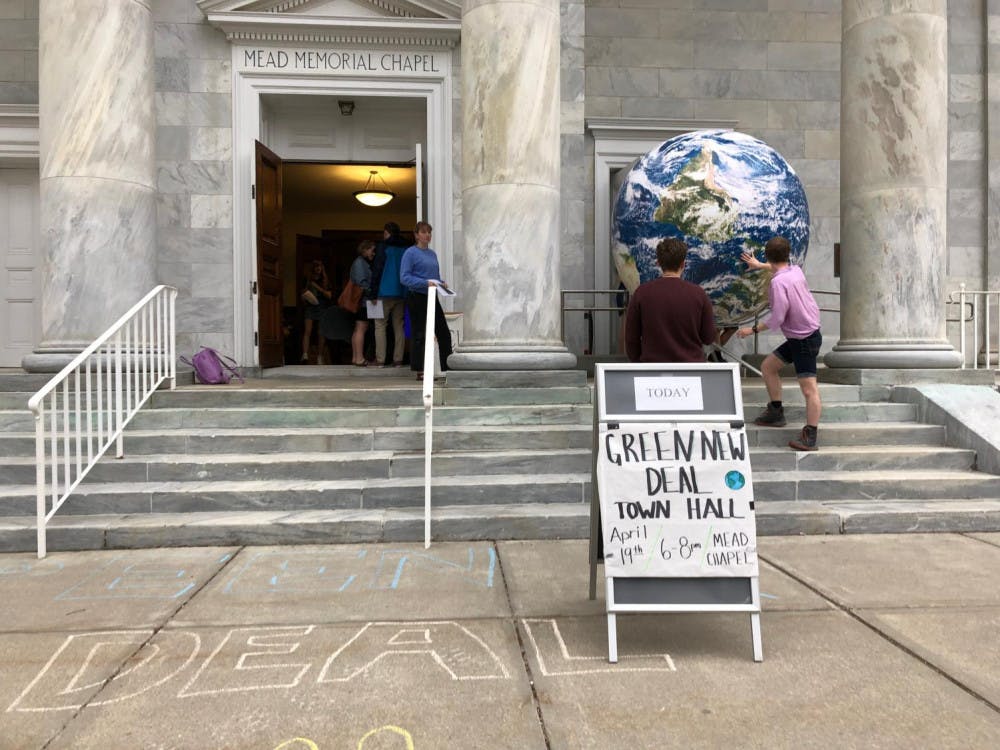
Comments



